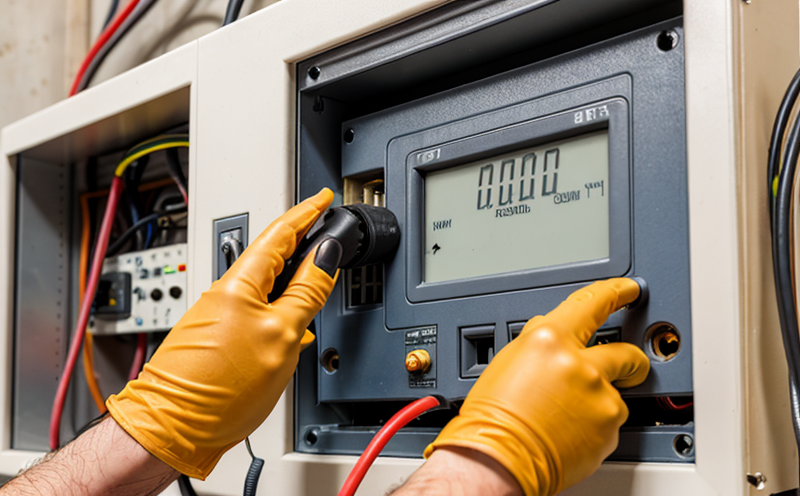KS C IEC 62619 Functional Testing of Industrial Lithium Batteries
The Korea Standard (KS) C IEC 62619 standard specifies the functional testing methods for industrial lithium batteries. This test is critical in ensuring that industrial lithium batteries meet all safety, performance, and reliability requirements before deployment in demanding applications such as medical devices, automotive systems, and power electronics.
The IEC 62619 standard provides a robust framework to evaluate the functionality of battery-operated equipment under various conditions. The test protocol includes comprehensive checks on electrical characteristics, thermal stability, and operational performance. Compliance with this standard ensures that industrial lithium batteries are reliable and safe for use in harsh environments.
The testing process involves several stages, including initial inspection, sample preparation, and functional tests. During the initial inspection, the battery is visually examined for any defects or anomalies. The next step is to prepare the specimen by ensuring it is in a stable condition, which may involve conditioning the battery at specific temperatures and voltages.
The core of the testing process involves applying electrical stress to the battery under controlled conditions. This includes charging and discharging cycles at various rates and temperatures. The battery's performance is monitored throughout these cycles, with key parameters such as voltage, current, internal resistance, and temperature being recorded. These measurements help determine if the battery meets the specified functional requirements.
The acceptance criteria for this test are stringent and are designed to ensure that industrial lithium batteries perform consistently across different environmental conditions. The standard specifies tolerances for electrical characteristics and operational limits. For instance, the maximum allowable internal resistance is set at a specific value, and the battery must maintain its voltage within certain bounds during discharge.
The results of the functional testing are detailed in a comprehensive report that includes all test parameters and their corresponding values. This report serves as a critical document for quality managers and compliance officers to ensure regulatory adherence. It also provides valuable insights for R&D engineers, helping them identify areas for improvement in future battery designs.
| Test Parameter | Description | Acceptance Criteria |
|---|---|---|
| Voltage | The voltage measured during the discharge cycle. | Must not fall below 3.2V under any condition. |
| Internal Resistance | The resistance measured internally within the battery. | Must be less than 50mΩ for all tested samples. |
| Cycling Stability | The number of successful charge and discharge cycles. | Must complete at least 500 full charge-discharge cycles without failure. |
By adhering to the KS C IEC 62619 standard, industrial lithium batteries can be tested thoroughly for their functional integrity. This ensures that they perform reliably in real-world conditions and meet all safety and performance expectations set forth by regulatory bodies.
| Industry Applications |
|---|
| Medical devices requiring reliable power supply. |
| Automotive systems where battery performance is critical for safety. |
| Power electronics in industrial settings. |
The test procedures outlined in KS C IEC 62619 are essential for ensuring the reliability and safety of industrial lithium batteries. By following these standards, manufacturers can produce high-quality products that meet all necessary regulatory requirements.
Why Choose This Test
Selecting the KS C IEC 62619 functional testing ensures that your industrial lithium batteries are thoroughly evaluated for their functionality and reliability. This test is particularly important in industries where battery performance can directly impact safety, efficiency, and product lifespan.
- Guaranteed compliance with international standards.
- Comprehensive evaluation of electrical characteristics and operational stability.
- Identification of potential defects early in the manufacturing process.
- Enhanced confidence in product quality for regulatory approval.
The test results are invaluable for quality managers, as they provide detailed insights into the performance of industrial lithium batteries. This information is crucial for making informed decisions about production processes and improving battery design. For compliance officers, adherence to this standard ensures that all products meet strict regulatory requirements, thereby minimizing legal risks.
R&D engineers benefit from the functional testing process by gaining valuable data that can be used to refine and optimize future battery designs. This test helps in identifying areas where improvements are needed and provides a benchmark for evaluating new materials or technologies.
Use Cases and Application Examples
The KS C IEC 62619 functional testing is widely used across various industries, particularly those that rely heavily on battery-operated equipment. Here are some specific use cases:
- Medical Devices: Ensuring the reliability of power supply for life-saving devices.
- Automotive Systems: Verifying the safety and performance of batteries used in electric vehicles.
- Power Electronics: Guaranteeing consistent performance in industrial settings where power quality is critical.
| Use Case | Description |
|---|---|
| Medical Devices | Testing the battery used in a heart monitor to ensure it operates reliably under all conditions. |
| Automotive Systems | Evaluating the performance of batteries in hybrid and electric vehicles for safety and efficiency. |
| Power Electronics | Assessing the stability of batteries used in solar power inverters to ensure consistent output. |
In each of these applications, the KS C IEC 62619 functional testing plays a crucial role in ensuring that industrial lithium batteries meet all necessary performance and safety standards. This test is particularly beneficial for industries where battery failures could have serious consequences.





